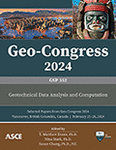Multi-Scale Study of Specimen Size Effect on Shear Strength of Polydisperse Granular Materials Using DEM
Publication: Geo-Congress 2024
ABSTRACT
In soil shear strength characterization, particle size is usually much smaller than the testing device size. However, when particle size is similar to the size of the apparatus (e.g., for coarse granular materials), the mechanical response becomes less reliable. To address this, international standards prescribe minimum sample scales based on maximal particle and device sizes. Nevertheless, the influence of the sample scale on the mechanical response is still not well understood. This topic is studied through simple shear simulations in the frame of the discrete-element method, covering a wide range of sample scales and particle size distributions. Micromechanical analyses of force and contact configurations reveal that the stability of parameters is linked to the formation of local rigid structures that carry forces significantly higher than the average. When the height of these structures becomes comparable to that of the sample, macroscopic and microscopic parameters deviate from those found under larger sample scales. Although these findings require further validation, this work suggests that the standards may need to be re-evaluated for an effective material characterization.
Get full access to this article
View all available purchase options and get full access to this chapter.
REFERENCES
ASTM. (2020). Standard test method for direct shear test of soils under consolidated drained conditions, Standard D3080/D3080M-11.
ASTM. (2021). Standard test method for consolidated drained triaxial compression test for soils, Standard D6467.
ASTM. (2020). Consolidated undrained direct simple shear testing of fine grain soils, Standard D6528.
Azéma, E., Radjai, F., Peyroux, R., and Saussine, G. (2007). “Force transmission in a packing of pentagonal particles.” Phys. Rev. E, 76, 011301.
Barton, N., and Kjærnsli, B. (1981). “Shear strength of rockfill.” Journal of the Geotechnical Engineering Division, 107(7), 873–891.
BS (British Standard Institution). (1990). Methods of test for soils for civil engineering purposes. shear strength tests (total stress), Standard 1377.
Cantor, D., Azéma, E., Sornay, P., and Radjai, F. (2018). “Rheology and structure of polydisperse three-dimensional packings of spheres.” Phys. Rev. E, 98, 052910.
Cantor, D., Azéma, E., and Preechawuttipong, I. (2020). “Microstructural analysis of sheared polydisperse polyhedral grains.” Phys. Rev. E, 101, 062901.
Cerato, A., and Lutenegger, A. (2006). “Specimen size and scale effects of direct shear box tests of sands.” Geotechnical Testing Journal, 29(6), 507–516.
Cundall, P. A., and Strack, O. D. L. (1979). “A discrete numerical model for granular assemblies.” Géotechnique, 29(1), 47–65.
da Cruz, F., Emam, S., Prochnow, M., Roux, J.-N., and Chevoir, F. (2005). “Rheophysics of dense granular materials: Discrete simulation of plane shear flows.” Phys. Rev. E, 72, 021309.
Dubois, F., and Jean, M. (2022). “LMGC90 wiki page”. <https://git-xen.lmgc.univ-montp2.fr/lmgc90/lmgc90_user/wikis/home>, (May 19,2023).
Fumagalli, E. (1969). “Tests on cohesionless materials for rockfill dams.” Journal of the Soil Mechanics and Foundations Division, 95(1), 313–332.
GDR-Midi. (2004). “On dense granular flows.” European Physical Journal E, 14, 341–365.
Holtz, W. G., and Gibbs, H. J. (1956). “Triaxial shear tests on pervious gravelly soils.” Journal of the Soil Mechanics and Foundations Division, 82(1), 867–1–867–22.
Jacobson, D., Valdes, J., and Evans, T. (2007). “A numerical view into direct shear specimen size effects.” Geotechnical Testing Journal, 30(6), 512–516.
Jean, M. (1999). “The non-smooth contact dynamics method.” Computer Methods in Applied Mechanics and Engineering, 177(3-4), 235–257.
Jewell, R. A., and Wroth, C. P. (1987). “Direct shear tests on reinforced sand”. Géotechnique, 37(1), 53–68.
JGS (Japanese Geotechnical Society). (2015). Preparation of soil specimens for triaxial tests, Standard 0525.
JGS (Japanese Geotechnical Society). (2015). Preparation of specimens of coarse granular materials for triaxial tests. Standard 0530.
JGS (Japanese Geotechnical Society). (2015). Method for consolidated constant pressure direct box shear test on soils. Standard 0561.
Marachi, N. (1969). Strength and deformation characteristics of rockfill materials. Ph.D. thesis, University of California, Berkeley.
Marsal, R. J. (1967). “Large scale testing of rockfill materials.” Journal of the Soil Mechanics and Foundations Division, 93(2), 27–43.
Muir Wood, D., and Maeda, K. (2008). “Changing grading of soil: effect on critical states.” Acta Geotechnica, 3(1), 3–14.
Nicot, F., Hadda, N., Guessasma, M., Fortin, J., and Millet, O. (2013). “On the definition of the stress tensor in granular media.” Int. J. Solids Struc., 50(14), 2508–2517.
Ovalle, C., and Dano, C. (2020). “Effects of particle size-strength and size-shape correlations on parallel grading scaling.” Géotechnique Letters, 10(2), 191–197.
Parsons, J. D. (1936). Progress report on an investigation of the shearing resistance of cohesionless soils. In Vol. 2 of Proc., 1st Int. Conf. Soil Mech. Found. Eng., 133–138.
Polania, O., Cabrera, M., Renouf, M., Azéma, E., and Estrada, N. (2023). “Grain size distribution does not affect the residual shear strength of granular materials: An experimental proof.” Phys. Rev. E, 107, L052901.
Radjai, F., and Richefeu, V. (2009). “Contact dynamics as a non-smooth discrete element method.” Mechanics of Materials, 41(6), 715–728.
Rothenburg, L., and Bathurst, R. (1989). “Analytical study of induced anisotropy in idealized granular materials.” Géotechnique, 39(4), 601–614.
Voivret, C., Radjai, F., Delenne, J.-Y., and El Youssoufi, M. S. (2009). “Multiscale force networks in highly polydisperse granular media.” Phys. Rev. Lett. 102, 178001.
Wang, J., and Gutierrez, M. (2010). “Discrete element simulations of direct shear specimen scale effects.” Géotechnique, 60(5), 395–409.
Information & Authors
Information
Published In
History
Published online: Feb 22, 2024
ASCE Technical Topics:
- Discrete element method
- Earth materials
- Engineering fundamentals
- Engineering materials (by type)
- Geomaterials
- Geomechanics
- Geotechnical engineering
- Granular materials
- Laboratory tests
- Material mechanics
- Material properties
- Materials characterization
- Materials engineering
- Methodology (by type)
- Numerical methods
- Particle size distribution
- Shear strength
- Shear tests
- Soil mechanics
- Soil properties
- Soil strength
- Strength of materials
- Tests (by type)
Authors
Metrics & Citations
Metrics
Citations
Download citation
If you have the appropriate software installed, you can download article citation data to the citation manager of your choice. Simply select your manager software from the list below and click Download.
